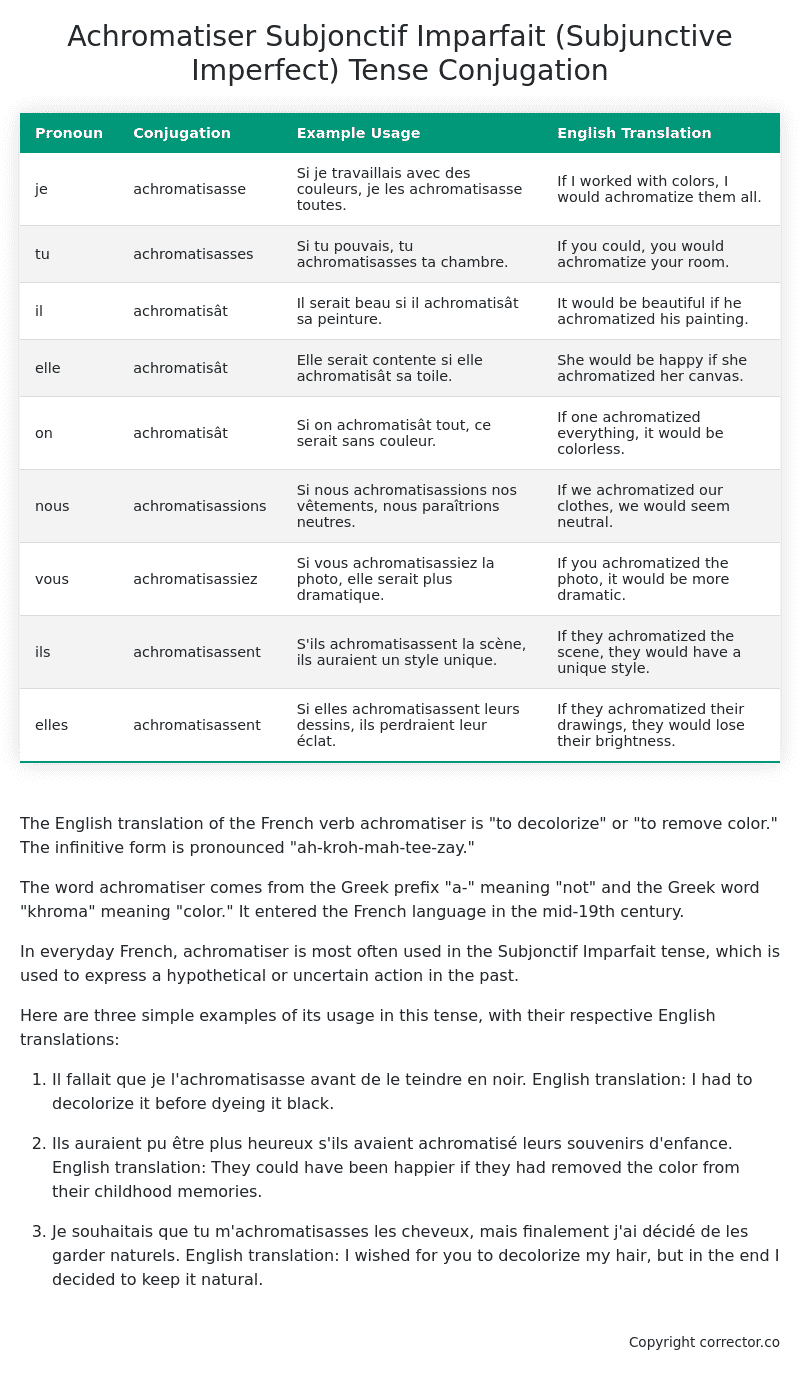Subjonctif Imparfait (Subjunctive Imperfect) Tense Conjugation of the French Verb achromatiser
Introduction to the verb achromatiser
The English translation of the French verb achromatiser is “to decolorize” or “to remove color.” The infinitive form is pronounced “ah-kroh-mah-tee-zay.”
The word achromatiser comes from the Greek prefix “a-” meaning “not” and the Greek word “khroma” meaning “color.” It entered the French language in the mid-19th century.
In everyday French, achromatiser is most often used in the Subjonctif Imparfait tense, which is used to express a hypothetical or uncertain action in the past.
Here are three simple examples of its usage in this tense, with their respective English translations:
-
Il fallait que je l’achromatisasse avant de le teindre en noir.
English translation: I had to decolorize it before dyeing it black. -
Ils auraient pu être plus heureux s’ils avaient achromatisé leurs souvenirs d’enfance.
English translation: They could have been happier if they had removed the color from their childhood memories. -
Je souhaitais que tu m’achromatisasses les cheveux, mais finalement j’ai décidé de les garder naturels.
English translation: I wished for you to decolorize my hair, but in the end I decided to keep it natural.
Table of the Subjonctif Imparfait (Subjunctive Imperfect) Tense Conjugation of achromatiser
| Pronoun | Conjugation | Example Usage | English Translation |
|---|---|---|---|
| je | achromatisasse | Si je travaillais avec des couleurs, je les achromatisasse toutes. | If I worked with colors, I would achromatize them all. |
| tu | achromatisasses | Si tu pouvais, tu achromatisasses ta chambre. | If you could, you would achromatize your room. |
| il | achromatisât | Il serait beau si il achromatisât sa peinture. | It would be beautiful if he achromatized his painting. |
| elle | achromatisât | Elle serait contente si elle achromatisât sa toile. | She would be happy if she achromatized her canvas. |
| on | achromatisât | Si on achromatisât tout, ce serait sans couleur. | If one achromatized everything, it would be colorless. |
| nous | achromatisassions | Si nous achromatisassions nos vêtements, nous paraîtrions neutres. | If we achromatized our clothes, we would seem neutral. |
| vous | achromatisassiez | Si vous achromatisassiez la photo, elle serait plus dramatique. | If you achromatized the photo, it would be more dramatic. |
| ils | achromatisassent | S’ils achromatisassent la scène, ils auraient un style unique. | If they achromatized the scene, they would have a unique style. |
| elles | achromatisassent | Si elles achromatisassent leurs dessins, ils perdraient leur éclat. | If they achromatized their drawings, they would lose their brightness. |
Other Conjugations for Achromatiser.
Le Present (Present Tense) Conjugation of the French Verb achromatiser
Imparfait (Imperfect) Tense Conjugation of the French Verb achromatiser
Passé Simple (Simple Past) Tense Conjugation of the French Verb achromatiser
Passé Composé (Present Perfect) Tense Conjugation of the French Verb achromatiser
Futur Simple (Simple Future) Tense Conjugation of the French Verb achromatiser
Futur Proche (Near Future) Tense Conjugation of the French Verb achromatiser
Plus-que-parfait (Pluperfect) Tense Conjugation of the French Verb achromatiser
Passé Antérieur (Past Anterior) Tense Conjugation of the French Verb achromatiser
Futur Antérieur (Future Anterior) Tense Conjugation of the French Verb achromatiser
Subjonctif Présent (Subjunctive Present) Tense Conjugation of the French Verb achromatiser
Subjonctif Passé (Subjunctive Past) Tense Conjugation of the French Verb achromatiser
Subjonctif Imparfait (Subjunctive Imperfect) Tense Conjugation of the French Verb achromatiser (this article)
Conditionnel Présent (Conditional Present) Tense Conjugation of the French Verb achromatiser
Conditionnel Passé (Conditional Past) Tense Conjugation of the French Verb achromatiser
L’impératif Présent (Imperative Present) Tense Conjugation of the French Verb achromatiser
L’infinitif Présent (Infinitive Present) Tense Conjugation of the French Verb achromatiser
Struggling with French verbs or the language in general? Why not use our free French Grammar Checker – no registration required!
Get a FREE Download Study Sheet of this Conjugation 🔥
Simply right click the image below, click “save image” and get your free reference for the achromatiser Subjonctif Imparfait tense conjugation!

Achromatiser – About the French Subjonctif Imparfait (Subjunctive Imperfect) Tense
Formation
Common Everyday Usage Patterns
Interactions with Other Tenses
Subjonctif Présent
Indicatif Passé Composé
Conditional
Conditional Perfect
Summary
I hope you enjoyed this article on the verb achromatiser. Still in a learning mood? Check out another TOTALLY random French verb conjugation!


